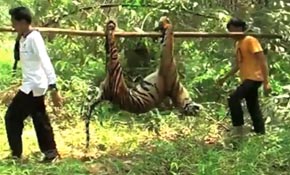
The paper giant was quick to blame the tiger's death on local villagers.
'Wildlife traps of this kind are a very common occurrence in remote areas in Sumatra. Reports on the situation indicate that the traps were intended to target small mammals such as wild boar and deer and not illegal poaching of protected tigers. The tragedy of this situation is that it may appear the tiger was not found until days after being caught in the trap,' said APP in a statement on Monday (25 July).
In an ironic twist, this response from the forestry giant was sent out just hours after it gave an update on its tiger relocation program – news swiftly overshadowed when Greenpeace released graphic video footage of a tiger that had been 'trapped for six days in total without food or water'.
According got the NGO: 'The spot where the tiger became trapped was on the border of PT Arara Abadi, an APP acacia plantation.'
'Video footage reveals that nearby the spot where the tiger wandered into the trap, and later died, there was a large area of recently destroyed forest where active clearing was ongoing. Only 13 kilometres away from where the excavators were at work is the spot where this animal spent its last days trapped, injured and starving,' according to Greenpeace.
The NGO believes there are just 400 Sumatran tigers left in the wild.
Earlier this month, Greenpeace revealed that Lego had become 'the first major toy company to announce plans to remove deforestation from its supply chain, following a Greenpeace campaign launched last month'.
Helle Sofie Kaspersen, vice-president of corporate governance and sustainability at the Lego Group, said: 'It is our intent that we will only source material from suppliers that are not involved in deforestation.'
Meanwhile, leading environmental consultant Brendan May has published an 'A frank and open letter to Asia Pulp & Paper ', in which he said 'it's time [APP] listened to the clamour for progress that is all around'.
In his blog, May has written: 'You [APP] and those who speak on your behalf claim that 'western NGOs' do not understand or care about poverty and development in Indonesia. This is a falsehood on two counts.
'The first is that western NGOs do, of course, care about poverty alleviation. The second, as you know very well, is there are plenty of Indonesian NGOs who share the collective horror at the destruction of old-growth forests in which you have, for years, been implicated.'
Click here to read May's blog.
In May, APP announced its Rainforest Realities corporate blog, 'a place for open dialogue about news, events and issues related to our forests, wildlife and indigenous communities in Indonesia, as well as other parts of the world'.
Comment below to have your say on this story.
If you have a news story or tip-off, get in touch at editorial@sprinter.com.au.
Sign up to the Sprinter newsletter


